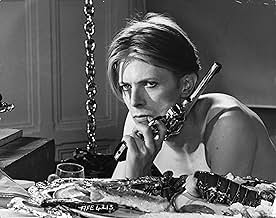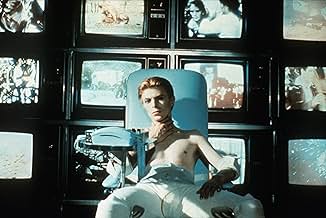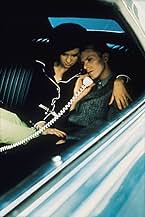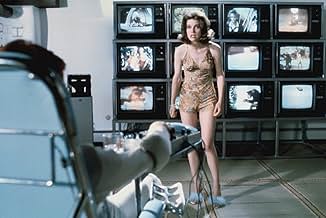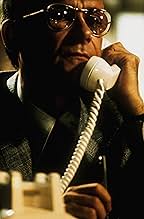AVALIAÇÃO DA IMDb
6,6/10
30 mil
SUA AVALIAÇÃO
Um alienígena deve fingir ser humano para salvar seu planeta moribundo, mas uma mulher e alguns homens criam complicações.Um alienígena deve fingir ser humano para salvar seu planeta moribundo, mas uma mulher e alguns homens criam complicações.Um alienígena deve fingir ser humano para salvar seu planeta moribundo, mas uma mulher e alguns homens criam complicações.
- Prêmios
- 1 vitória e 4 indicações no total
Jim Lovell
- Capt. James Lovell, Commander of Apollo 13
- (as Capt. James Lovell)
Dort Clark
- Waiter
- (não creditado)
- Direção
- Roteiristas
- Elenco e equipe completos
- Produção, bilheteria e muito mais no IMDbPro
Avaliações em destaque
I have just watched "The Man Who Fell to Earth" from beginning to end after seeing several scenes here and there from years of flipping past the sci-fi channel or whatever other channel this film might've been shown on. I must say that I think it is one of the most interesting films I've ever seen. Now before you start thinking this is going to be a review of blind worship, stop for a moment and remember that just because something is interesting doesn't mean it's likeable. Art is not meant to be appealing. It's meant to cause a reaction, it's meant to make you think, it's meant to make you uncomfortable. Art forces feelings upon you that you might rather not experience, so whether you like it or not, this film is a work of art. But some art...in fact a lot of art...is trash. Is this movie trash? Some say yes, some say not. Some think it's brilliant, others think it a waste of time. Some think the narrative's dependence on visual stimulus as opposed to linear storytelling is a touch of cinematic beauty, while others dismiss it as experimental tripe.
Somebody wrote a scathing review saying that if you like junk like "Lost Highway," you might enjoy this movie. Well, no offense meant, but I'd like to say that this person has made clear that he can't see past what's appealing. Why watch something that's unappealing you might ask? Because that's what art's supposed to do...it challenges you and your values. Sometimes it reinforces them, and sometimes it will blatantly attack them. You have to draw your own conclusions and interpretations. "The Man Who Fell to Earth" is no different. Yes, the film seems to jump from time to time, one scene juxtaposed with a scene that takes place 20 years later, a flashback that may or may not be a flashback, it is confusing. I know I was confused. It's not a linear narrative...it's telling a story through pictures, with occasional words just to make sure you have a little more than an inkling as to what you're supposed to be seeing. Personally, I would be interested to see the movie without dialogue...like "Aeon Flux," a story can be told philosophically and artistically without words.
What is the story? Well...quite simply, David Bowie, in his first and probably one of his best on-screen performances, is an alien on Earth trying to find a way to get water back to his world. Is it as simple as it sounds? Not by any means. But you have to believe it to see it. You will be confused, you might even be offended (there's a lot of sexually explicit scenes that border on pornography), but one way or the other, this film is meant to be visually stimulating. What you see will make you think...if you're repulsed by it and feel the urge to turn it off, then it's simply not your kind of movie.
On the whole, I like this movie, though I must be in a certain mood to watch it. It is not easy to watch, there are long stretches without dialogue, and when there is dialogue, it's often confusing. But no matter what, I like what I was seeing on the screen. I do feel like watching it again because I know there is more to absorb and take in, there's more to think about that I missed before. But that's the kind of person I am...I want to think, and I want that discomfort this movie gives me because I am alleviated by the need to solve it, not dismiss it. Bowie is in fine form, probably used to alienation being a Brit in America, and having played his own Ziggy Stardust character in the past. The rest of the cast performs rather competently, although nobody's performance shines as much as Bowie's (although Candy Clarke is pretty good in some scenes, and Rip Torn's deadpan performance is a bit of dry humor).
Dispute me if you must, I give this movie ***1/2 out of ****.
Somebody wrote a scathing review saying that if you like junk like "Lost Highway," you might enjoy this movie. Well, no offense meant, but I'd like to say that this person has made clear that he can't see past what's appealing. Why watch something that's unappealing you might ask? Because that's what art's supposed to do...it challenges you and your values. Sometimes it reinforces them, and sometimes it will blatantly attack them. You have to draw your own conclusions and interpretations. "The Man Who Fell to Earth" is no different. Yes, the film seems to jump from time to time, one scene juxtaposed with a scene that takes place 20 years later, a flashback that may or may not be a flashback, it is confusing. I know I was confused. It's not a linear narrative...it's telling a story through pictures, with occasional words just to make sure you have a little more than an inkling as to what you're supposed to be seeing. Personally, I would be interested to see the movie without dialogue...like "Aeon Flux," a story can be told philosophically and artistically without words.
What is the story? Well...quite simply, David Bowie, in his first and probably one of his best on-screen performances, is an alien on Earth trying to find a way to get water back to his world. Is it as simple as it sounds? Not by any means. But you have to believe it to see it. You will be confused, you might even be offended (there's a lot of sexually explicit scenes that border on pornography), but one way or the other, this film is meant to be visually stimulating. What you see will make you think...if you're repulsed by it and feel the urge to turn it off, then it's simply not your kind of movie.
On the whole, I like this movie, though I must be in a certain mood to watch it. It is not easy to watch, there are long stretches without dialogue, and when there is dialogue, it's often confusing. But no matter what, I like what I was seeing on the screen. I do feel like watching it again because I know there is more to absorb and take in, there's more to think about that I missed before. But that's the kind of person I am...I want to think, and I want that discomfort this movie gives me because I am alleviated by the need to solve it, not dismiss it. Bowie is in fine form, probably used to alienation being a Brit in America, and having played his own Ziggy Stardust character in the past. The rest of the cast performs rather competently, although nobody's performance shines as much as Bowie's (although Candy Clarke is pretty good in some scenes, and Rip Torn's deadpan performance is a bit of dry humor).
Dispute me if you must, I give this movie ***1/2 out of ****.
Maybe Starman David Bowie was born to play the title role in The Man Who Fell To Earth, an avant-garde disjointed sci fi film from director Nicolas Roeg.
Thomas Jerome Newton (David Bowie) is an alien who lands in New Mexico with some precious rings, a British passport and some rudimentary knowledge of patents. He needs to make money so he can build a rocket ship that can transport water to his dying planet.
Newton quickly makes money through his advanced business patents, he recruits a chief scientist (Rip Torn) who discovers that he is not what he appears to be and falls in love with hotel maid (Candy Clark) who also introduces him to the delights of gin & tonic.
The government intelligence service and rival businesses decide to look closely into his activities. They throw his patent lawyer and business associate (Buck Henry) out of the window and then hold Newton captive in a hotel plying him with gin.
The film plays with time as years go by and other characters age. We have flashbacks of Newton in his home planet with his family. The most memorable scenes is that of an alien with a British passport and the famous scene of Clark urinating her underwear when Newton reveals himself as an alien.
The film has a cult following but it is not a great film. It is too trippy and unstructured leading you to ask more questions than get any answers from it. Still I cannot think of anyone else who could had played the title role in that era and Bowie goes for it full frontal.
However the combination of Bowie and Roeg makes this a landmark science fiction film of the 1970s just as worthy as Close Encounters of the Third Kind.
Thomas Jerome Newton (David Bowie) is an alien who lands in New Mexico with some precious rings, a British passport and some rudimentary knowledge of patents. He needs to make money so he can build a rocket ship that can transport water to his dying planet.
Newton quickly makes money through his advanced business patents, he recruits a chief scientist (Rip Torn) who discovers that he is not what he appears to be and falls in love with hotel maid (Candy Clark) who also introduces him to the delights of gin & tonic.
The government intelligence service and rival businesses decide to look closely into his activities. They throw his patent lawyer and business associate (Buck Henry) out of the window and then hold Newton captive in a hotel plying him with gin.
The film plays with time as years go by and other characters age. We have flashbacks of Newton in his home planet with his family. The most memorable scenes is that of an alien with a British passport and the famous scene of Clark urinating her underwear when Newton reveals himself as an alien.
The film has a cult following but it is not a great film. It is too trippy and unstructured leading you to ask more questions than get any answers from it. Still I cannot think of anyone else who could had played the title role in that era and Bowie goes for it full frontal.
However the combination of Bowie and Roeg makes this a landmark science fiction film of the 1970s just as worthy as Close Encounters of the Third Kind.
The Man Who Fell To Earth is ultimately a frustrating film. The phrase 'the sum of its parts is greater than the whole' definitely applies. At times it's brilliant and original, but it's effectively brought down by its overlong running time and relentlessly obtuse presentation. It begins very promisingly but falls away in the final third, where it just loses focus and direction. Visually, as can be expected from Nicolas Roeg, it's often quite excellent, with his usual bold editing techniques in place too. The cinematography is very good and David Bowie certainly looks the part. Roeg certainly had a thing for using singers in lead roles. He also utilized Mick Jagger in Performance and Art Garfunkel in Bad Timing, and Bowie like those other two is used to good effect. He doesn't really need to act very much; Bowie in the mid 70's was an almost alien-like creature to begin with. I thought Candy Clark was very good as Mary-Lou. She brought some warmth to the proceedings which was appreciated.
Like Roeg's work in general, there is hardly any humour here. He was primarily a visionary auteur and The Man Who Fell To Earth is undoubtedly a work that allows him to express himself in a highly personal way. But unlike in Performance, Walkabout, Don't Look Now and even Bad Timing the technique never seemed to achieve an overall whole. My feeling is that I would need to re-watch this movie in order to develop a better appreciation of it. On first impressions, it's a collection of great moments within an impenetrable whole. A very strange film though.
Like Roeg's work in general, there is hardly any humour here. He was primarily a visionary auteur and The Man Who Fell To Earth is undoubtedly a work that allows him to express himself in a highly personal way. But unlike in Performance, Walkabout, Don't Look Now and even Bad Timing the technique never seemed to achieve an overall whole. My feeling is that I would need to re-watch this movie in order to develop a better appreciation of it. On first impressions, it's a collection of great moments within an impenetrable whole. A very strange film though.
so, it seems to me there have been a lot of negative reviews. they break down into two categories: 1) those that say its got "too much sex". blah. grow up. 2) those who say "it's a mess". okay...we can work with that.
this really isnt a plot-based scifi like Star Wars. its not about linear events with obvious cause-and-effects, good guys and bad. its part scifi, part art film, and part trippy 70s movie. these movies dont speak with dialogue, they speak with images, and with mood (ie, "How does this sequence make you feel?" warm? uncomfortable? etc) thats just what this movie is. if you dont like these types of movies--movies in which you may have to do some interpretation--you wont like this one either. simple. its not Star Wars, people...Lucas isnt here to hold your hand.
for instance, one of the "gratuitous" sex scenes near the end, after Mary Lou has aged, was not gratuitous but in fact grotesque. it made me uncomfortable. which i am certain is exactly what it was supposed to do--to show me what a sham Newton's relationship with Mary Lou had become. it had become merely a drunken-memory, for them both... and their sex-scene-revisited depicted that, perfectly.
the whole movie is like that, speaking in general feelings and mood rather than black-and-white dialogue. and its more powerful because of it.
so...put it in perspective as you critic it. dont like romantic comedies? then youre not gonna like the latest Hugh Grant film. but that doesnt mean it isnt good. capese? (btw, i think hugh grant movies suck).
this really isnt a plot-based scifi like Star Wars. its not about linear events with obvious cause-and-effects, good guys and bad. its part scifi, part art film, and part trippy 70s movie. these movies dont speak with dialogue, they speak with images, and with mood (ie, "How does this sequence make you feel?" warm? uncomfortable? etc) thats just what this movie is. if you dont like these types of movies--movies in which you may have to do some interpretation--you wont like this one either. simple. its not Star Wars, people...Lucas isnt here to hold your hand.
for instance, one of the "gratuitous" sex scenes near the end, after Mary Lou has aged, was not gratuitous but in fact grotesque. it made me uncomfortable. which i am certain is exactly what it was supposed to do--to show me what a sham Newton's relationship with Mary Lou had become. it had become merely a drunken-memory, for them both... and their sex-scene-revisited depicted that, perfectly.
the whole movie is like that, speaking in general feelings and mood rather than black-and-white dialogue. and its more powerful because of it.
so...put it in perspective as you critic it. dont like romantic comedies? then youre not gonna like the latest Hugh Grant film. but that doesnt mean it isnt good. capese? (btw, i think hugh grant movies suck).
Several things about this film make it worth watching... beginning with the premise that Earth's abundant water is what makes it rare in the galaxy.
But more intriguing is how the alien visitor, landing with absolutely nothing but the clothes on his back and a gold wedding ring, and knowing absolutely nothing about Earth culture, "gets up to speed" with astonishing, ruthless, clear-sighted rapidity...within days raising the $10,000 he offers a patent attorney for one hour of the latter's time. In that hour, Bowie's character outlines three basic patents -- including two which we can recognize today as digital cameras and music.
A particularly fascinating scene has our newly rich and already bored alien watching about 20 TV sets at once, while holding a small, battery-powered propeller. Repeated viewings will reveal that the disparate programs (presumably actual images of television shows) occasionally "come together" to form coherent messages... at which time our hero spins the propeller.
But more intriguing is how the alien visitor, landing with absolutely nothing but the clothes on his back and a gold wedding ring, and knowing absolutely nothing about Earth culture, "gets up to speed" with astonishing, ruthless, clear-sighted rapidity...within days raising the $10,000 he offers a patent attorney for one hour of the latter's time. In that hour, Bowie's character outlines three basic patents -- including two which we can recognize today as digital cameras and music.
A particularly fascinating scene has our newly rich and already bored alien watching about 20 TV sets at once, while holding a small, battery-powered propeller. Repeated viewings will reveal that the disparate programs (presumably actual images of television shows) occasionally "come together" to form coherent messages... at which time our hero spins the propeller.
Você sabia?
- CuriosidadesThe picture was temporarily scored with music from Pink Floyd's album "The Dark Side of the Moon".
- Erros de gravaçãoWhen Mary-Lou takes Thomas to the hotel's fifth floor in the elevator instead of allowing him to use the stairs, she says, "It's five flights." This would be correct in the UK, but not in America; from the ground floor to the fifth floor of an American building is four flights.
- Citações
Thomas Jerome Newton: Ask me...
Nathan Bryce: What?
Thomas Jerome Newton: The question you've been wanting to ask ever since we met.
Nathan Bryce: Are you Lithuanian?
Thomas Jerome Newton: [grins] I come from England.
Nathan Bryce: Ah, that's not so terrible.
- Versões alternativasThe US theatrical release of the film was drastically altered. Not only were 20 minutes cut (including the gun sequence) but some scenes were rearranged and a few scenes had different camera angles.
- ConexõesEdited into We are the Robots (2010)
Principais escolhas
Faça login para avaliar e ver a lista de recomendações personalizadas
- How long is The Man Who Fell to Earth?Fornecido pela Alexa
Detalhes
- Data de lançamento
- País de origem
- Idioma
- Também conhecido como
- El hombre que cayó a la Tierra
- Locações de filme
- Empresas de produção
- Consulte mais créditos da empresa na IMDbPro
Bilheteria
- Orçamento
- US$ 1.500.000 (estimativa)
- Faturamento bruto nos EUA e Canadá
- US$ 100.072
- Fim de semana de estreia nos EUA e Canadá
- US$ 5.922
- 26 de jun. de 2011
- Faturamento bruto mundial
- US$ 167.072
- Tempo de duração2 horas 19 minutos
- Cor
- Mixagem de som
- Proporção
- 2.35 : 1
Contribua para esta página
Sugerir uma alteração ou adicionar conteúdo ausente

Principal brecha
By what name was O Homem Que Caiu na Terra (1976) officially released in India in Hindi?
Responda



